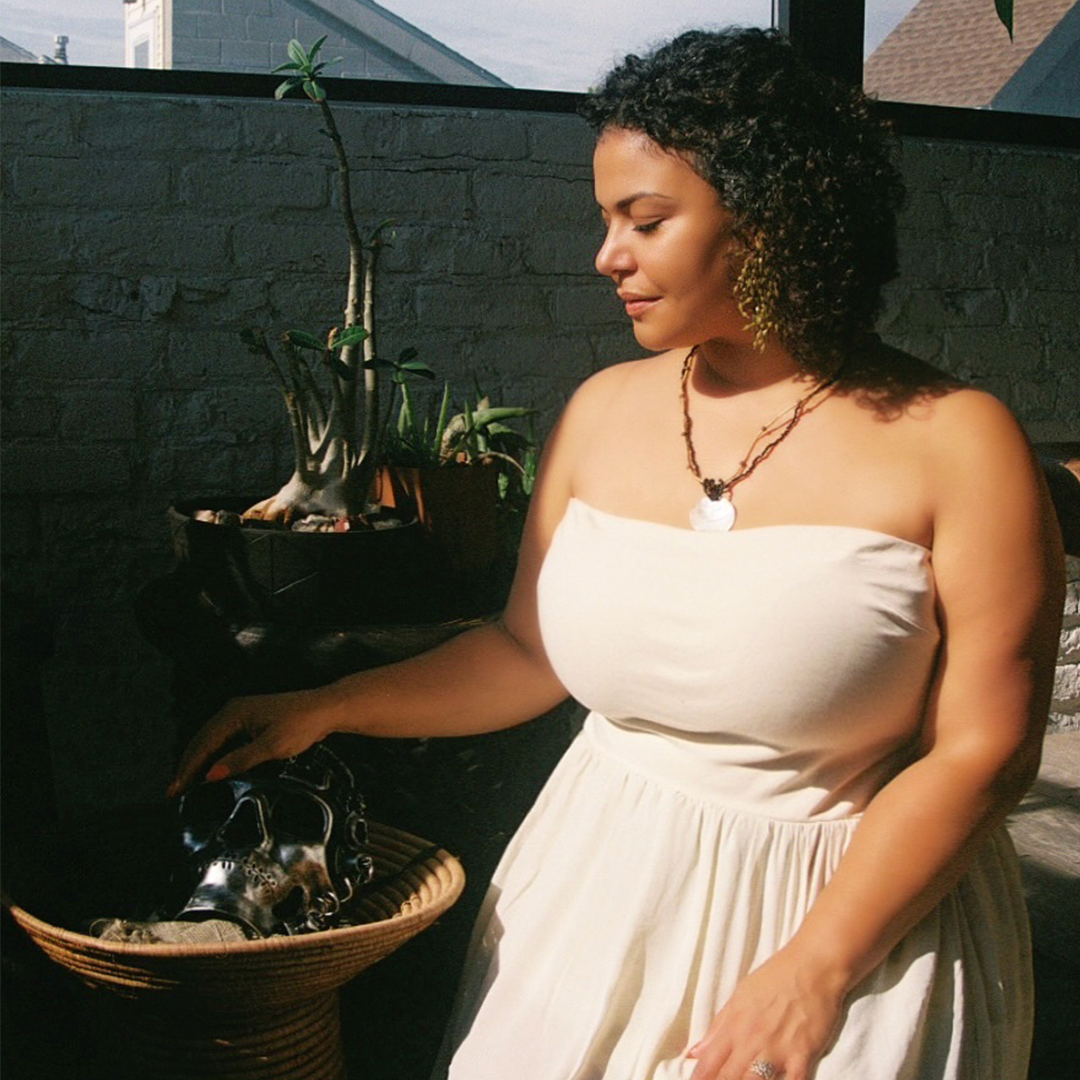Over a decade ago, Oakland native Evelyn LaChapelle was pregnant and finishing up college in L.A., when she did a favor for a friend’s marijuana distribution business. The favor involved the profits, not the plant, and she did it for less than a year. Afterwards, she thought she’d simply move on with her life: focus on her young daughter, her education, and her career ambitions in the hospitality industry. But LaChapelle’s minor role in the operation ultimately changed her life forever—in ways she and her family continue to grapple with to this day. Even after serving time in prison, the repercussions of LaChapelle’s stint with cannabis continue financially and emotionally, leaving her with inadequate resources to rebuild her life and ongoing employment discrimination.
“When I tell strangers I just got out of prison for weed, no one believes me,” she says. “I’m a nonviolent first-time offender with college degrees; I don't have tattoos on my face. It’s not the mental picture most people have of what inmates ‘look’ like. As the legal cannabis industry increases dramatically—being traded on the stock market—many are still sitting in prison.” Now, she’s passionate about paying it forward: Shortly after her 2019 release, LaChapelle began working with the Last Prisoner Project, a nonprofit devoted to criminal justice reform for over 40,000 people incarcerated for cannabis crimes at all stages, including clemency, release, reentry, and record expunging. Here, LaChapelle shares the details of her journey, the ongoing challenges she and others face, and how to take action. As told to Alexandra Ilyashov.
* * *
In January 2009, I was in my third year at Loyola Marymount University, had been working at Citibank for four years, and was pregnant. My friend Corvaine Cooper was shipping marijuana from California to North Carolina, and asked me to deposit the profits into my bank account. I said yes. I really didn't give it much thought, given the attitude and climate I'd grown up in around cannabis. I never considered the consequences—I really didn’t think there would be consequences. Had it been coke, heroin—any other drug—it would’ve been a definite ‘no.’ But knowing it was marijuana, I never even thought twice about it. I pulled myself out of it in September 2009 to work on my relationship and focus on school. I had my daughter, got married then divorced, and moved back to Oakland.
In August 2012, I was pulled over for a traffic stop and the officer ran my name. There was a warrant out for my arrest. That’s how I was informed I was involved in a conspiracy investigation. While I was in jail for a week awaiting arraignment, I learned that I was being charged with conspiracy with intent to distribute marijuana, conspiracy to money launder, and conspiracy structuring charges of bank transactions to avoid the IRS because I didn’t report the money as income. I went to trial for a week in North Carolina in October 2013: The jury found me and my two co-defendants, Corvaine and Natalia Wade, guilty on all charges.
“I dropped to my knees when I heard the verdict. I really didn’t think I’d be found guilty. The prosecution played on race and economics.”
I earned very little from the conspiracy, around $10,000 from the $1.3 million conspiracy charge—but I was charged with $1.3 million in profit. I was in a pretty toxic relationship with my child's father, and Corvaine was just a really good friend to me; it was more like companionship. The prosecutors had everyone believe I’d done it for the money, because I was pregnant. But I had enough financial support: I was on a trust fund from my grandfather that paid for my schooling and bills, and I worked full time at Citibank.
 Evelyn LaChapelle
Evelyn LaChapelle
I dropped to my knees when I heard the verdict. I really didn’t think I’d be found guilty. The prosecution played on race and economics by bringing us to a courtroom in North Carolina, where $10,000 is a large amount of money that in California or New York might only be three months’ rent. There wasn’t a single black person on my jury: everyone was white, middle-aged, 45- to 55-years-old. It was prosecuted as ‘it’s a drug ring, they're black, they're infiltrating our Southern states.’
Once we got to the holding cell, I was hysterical. I was dressed in court clothes—high heels and a skirt suit—and the only thing I could think about was picking up this high heel and just killing myself. I’d never, ever had those thoughts before. My first night was spent on suicide watch: They made me strip naked, put on a green padded vest down to my knees, and put me in a cell with only a metal bed frame, mattress, and a little metal toilet. I was in that North Carolina county jail awaiting sentencing for 22 months. The probation officer who interviewed me recommended to the court that I receive 247 months—around 25 years. I was a first-time, nonviolent offender; no other drugs, no weapons, just marijuana. It was devastating.
I hired another attorney, who found some major loopholes in the trial and negotiated my sentence with a polygraph test and my phone records to prove I hadn't had any contact with the supply chain and that my initial attorney was extremely negligent. Someone testified that I had contact with the buyers in North Carolina, which was not true; I’d never been involved with the supply chain. But prosecution played it as if I’d had a major role. After going back and forth, the prosecution said, ‘Okay, we'll recommend to the judge that you get eight years instead of 25 years if you waive all of your rights to an appeal.’ I agreed to that because it meant coming home when my daughter was nine, not 22. I just didn't have any more fight in me.
In Prison for Weed
I was sentenced to 87 months—seven years, three months. In July 2015, I got shipped to prison in Victorville, Southern California, about 400 miles away from my family but much closer than North Carolina. In August 2015, my second-worst night in prison happened: My stepmother died. She had brought me to the airport in October 2014 to go to trial, and I never saw her again after that. She and my father married when I was three and she definitely was my second mother. While I was in prison, my daughter was left in her and my mother’s care, alternating weeks. Her death set a really bitter tone for the rest of my imprisonment—the realization that they hadn’t just taken me away from my daughter and given me a crazy sentence, but they’d taken away my chance to see my stepmother ever again. LaChapelle during a prison visit at Victorville Prison Camp with her daughter, friend, and mother.
LaChapelle during a prison visit at Victorville Prison Camp with her daughter, friend, and mother.
I spent eight months in Victorville before being shipped to a prison in Arizona that has RDAP
I left
Then, I was released to a halfway house which required finding employment, so I worked in two restaurants as a waitress. I never thought reentry would be an issue for me—naively—because I have a degree, a pretty decent resume, and work experience. After the halfway house I was hired at the Omni Hotel in downtown San Francisco as sales and catering coordinator, the kind of work I did at the Marriott before I was incarcerated. I was on the job, doing everything up to standards. But two months in, a coworker Googled my name—maybe looking for my Facebook or Instagram—and the only thing that came up was an article on ICE’s website
 LaChapelle with Last Prisoner Project's Steve Deangelo.
LaChapelle with Last Prisoner Project's Steve Deangelo.
Corvain Cooper, who’s currently serving life, introduced me last June to the Last Prisoner Project: They’re extremely focused on getting cannabis inmates released, especially those serving life for the plant. They invited me for an interview to tell my story. I thought that’d be it, but so much has come from it. Prison convinced me I was serving the consequences of terrible decisions; I didn't come out thinking I’d received an unjust sentence. I wasn’t prepared to say, ‘Hey, this was wrong,’ I decided to just live with it, go to work, move forward—never talk about it again. But it was extremely validating to understand that what happened to me was extremely unjust. Last Prisoner Project helped me realize I could rewrite the story I’d been telling myself for five years in prison: ‘You fucked up, your daughter's suffering, you're the reason she's suffering and that her life will be terrible, you're a criminal, this is a major setback.’
Since November, I’ve been working at Vertosa
People should be conscious of how and where they're spending their money in the cannabis industry: support minority-run and social equity-focused businesses. Support brands that are part of the movement to get the 40,000 people released that are still serving time for the same plant you easily walk into the dispensary to purchase. Finding space at the executive level for people of color and the formerly incarcerated is where I think the cannabis industry should go next.
Prison is a breeding ground for learning how to cut off, how not to feel, and how to separate your emotions from yourself. There’s only so many nights you can cry.”
I think the Second Chance Act missed the mark. It allows prisons to decide what they want and how to implement it. Prison officials are not elected officials, and the prison system is here to make money, so they don't really benefit from giving inmates a second chance. There isn’t follow-through on the outside: I get home, am trying to gain employment, and I'm still faced with discrimination. A real second chance would be clearing records and preventing employers from discriminating. For federal inmates, the only way of getting an early release or record expungement is by the President of the United States. How ridiculous is that? In California, employers can no longer ask you if you’re a felon on job applications. I wasn’t asked that at Omni, but it didn’t prevent me from getting terminated. I didn't think I needed assistance, but I did. Programs will give you clothes for an interview or teach you how to write a resume, but there's nothing really tangible. No one’s helping you find a place to live or how to rebuild your credit; what you need to actually be a participating citizen. I’ve been out for two years and I still don't have my own place. The real help is missing.
When you're in prison and have family on the outside, everyone’s eager to get back to the way things were. But when you’re released, you realize things have shifted emotionally and mentally. My daughter was used to seeing me sporadically for a few years, playing games and eating snacks; she wasn't able to comprehend me stepping back into the mother role saying ‘I want you to do your homework and eat your vegetables.’ It was a shock for her.
Prison is a breeding ground for learning how to cut off, how not to feel, and how to separate your emotions from yourself. There’s only so many nights you can cry. Coming home, I wasn’t able to emotionally grieve what I had lost. I’ve been home over a year, and I'm just starting to scratch the surface of what I experienced emotionally. I only recently visited my stepmother's grave for the first time. My emotional capacity to handle things is very short and limited. I'm only now starting the process of healing, and getting back into the routine of being a free human being.






